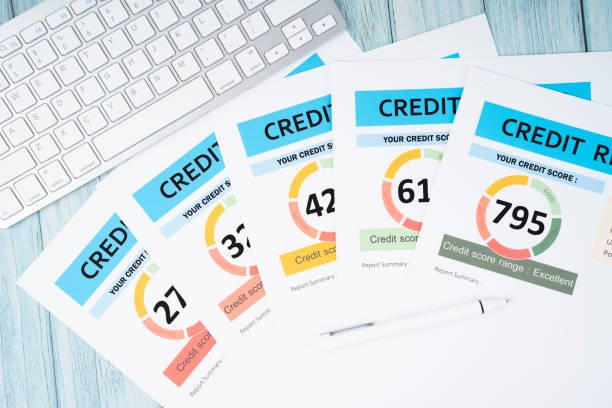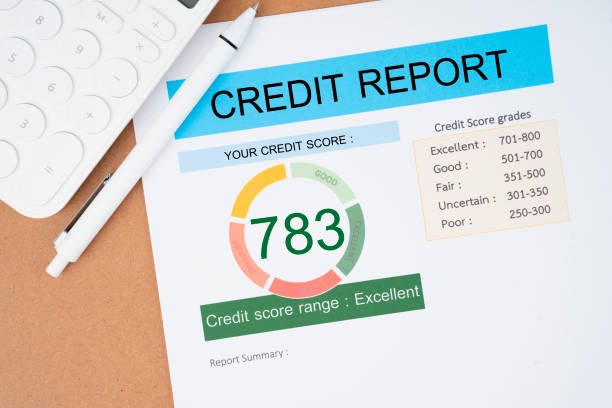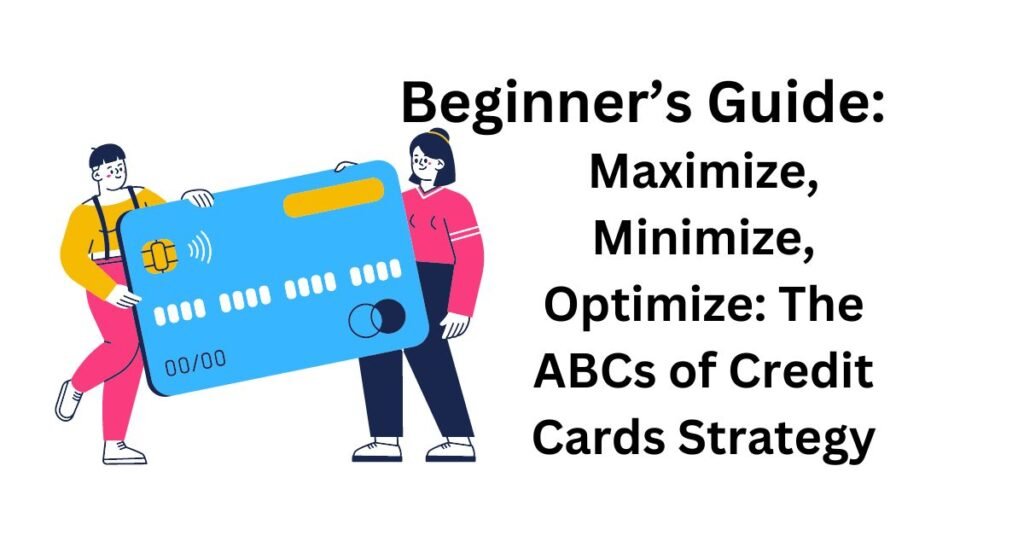Navigating the world of credit cards requires a strategic approach to maximize benefits, minimize risks, and optimize financial outcomes. Understanding the ABCs of Credit Card Strategy is essential for making informed choices that align with your financial goals.
A – Maximize Rewards
Cash Back and Points:
Choose credit cards with benefits that are suited to your spending patterns. Maximizing incentives, whether in the form of cash back, travel points, or other benefits, increases the value of every transaction.
Welcome Bonuses:
Profit from promotional deals and welcome incentives. Many credit cards provide large perks to new cardholders, such as bonus points or cash back after spending a certain amount.
Rotating Categories:
Some cards provide rotating reward categories with greater payout rates. Align your spending with these categories to maximize incentives throughout certain times of the year.
B – Minimize Costs
Interest Rates:
To reduce the expense of holding a load, prioritize cards with lower interest rates. Paying down the whole sum each month eliminates interest costs entirely.
Annual Fees:
Compare the advantages to the yearly charge. While some credit cards provide valuable benefits, others may not be worth the expense. Select cards with fees that correspond to your use and reward choices.
Foreign Transaction Fees:
When traveling overseas, use credit cards with free or minimal foreign transaction fees.
C – Optimize Credit Health
Credit Utilization:
Keep your credit use ratio low by maintaining balances far below your credit limit. This improves your credit score and allows you to access greater financial options.
Timely Payments:
To prevent late penalties and bad effects on your credit score, pay your credit card payments on time. To keep on track, set up automatic payments or reminders.
Credit Mix:
Diversify your credit mix by having credit cards, loans, and other credit accounts. This shows appropriate credit management and has a good impact on your credit score.
Mastering the ABCs of Credit Card Strategy helps you to make decisions that match with your financial well-being in the ever-changing credit card world. Maximize your benefits, reduce your charges, and improve your credit health to get the most out of your credit card experience. Credit cards may be used to help you achieve your financial objectives if you use them wisely and make educated decisions.
Credit Score Secrets Revealed

While there are no “secrets” to raising your credit score, there are some lesser-known ideas and tactics that may be beneficial. Remember that developing excellent credit takes time, and there are no fast cures. Here are some insights that may be called unconventional:
1. Quick Re-scoring:
If you’re planning to make big adjustments to your credit profile (for example, paying off a large loan), inquire with your lender regarding speedy re-scoring. This service enables for immediate modifications to your credit report, possibly increasing your score in a matter of days.
2. Letters of Goodwill:
If you have a track record of making on-time payments but have a single late payment, you may send a goodwill letter to your creditor describing the issue and asking that the late payment be removed off your credit report.
3. Agreements to Pay-for-Delete:
In certain situations, you may be able to arrange with a creditor or collection agency to pay off a debt in return for the bad information being removed off your credit report. This is referred to as a pay-for-delete arrangement.
4. Debt Verification:
If you have debts that are being collected, you may ask the collection agency for documentation that they hold the debt and have the authority to collect. If they are unable to authenticate the debt, it may be erased from your credit record.
5. Authorized User Policy:
Becoming an authorized user on someone else’s credit card, particularly if they have a lengthy and favorable credit history, might possibly raise your credit score.
6. Credit Piggybacking:
Some organizations provide the service of joining you to someone else’s seasoned tradeline (credit account) to raise your credit score. Be careful with this method, since it may have legal and ethical ramifications.
7. Secured Credit Cards:
If you have problems qualifying for a standard credit card, a secured credit card might be a beneficial tool. It needs a security deposit but may help develop or repair credit.
8. Mix of Credit Types:
Having a wide mix of credit types, such as credit cards, installment loans, and retail accounts, might favorably benefit your credit score.
9. Maintain Old Accounts:
Closing outdated credit card accounts might decrease your credit history, thus reducing your score. If feasible, leave your previous accounts open, even if you’re not actively using them.
10. Regularly Check Your Credit Report:
Monitoring your credit report periodically enables you to discover inaccuracies or fraudulent actions swiftly.
Remember that openness and honesty are key in dealing with your credit. Be wary with tactics that seem too good to be true, and consider talking with a financial expert or credit counselor for specialized assistance. Building excellent credit is a long-term commitment to healthy financial practices.
How to Improve Your Credit Score Fast?

It takes time to improve your credit score, but there are several tactics you may use to see quicker gains. Here are some short suggestions to help you increase your credit score:
1. Examine Your Credit Report:
- Request a copy of your credit report from each of the three main credit reporting agencies (Equifax, Experian, and Trans-Union).
- Check the reports for mistakes, inconsistencies, or fraudulent activities.
- Report any discrepancies to the appropriate credit bureau.
2. Always pay your bills on time:
- On-time bill payment has a big influence on your credit score.
- Set up automated payments or reminders to avoid missing a payment.
3. Reduce Credit Card Balances
- Aim to keep your credit card balances below 30% of your credit limit, and prioritize paying off high-interest cards.
4. Increase Credit Limits
- Contact your credit card companies to seek an increase in your credit limit. This has the potential to boost your credit usage ratio.
5. Don’t open too many accounts:
- Opening many new accounts in a short period of time will reduce your average account age and harm your credit score.
6. Diversify Your Credit Portfolio:
- Having a variety of credit kinds (credit cards, installment loans, etc.) might help your credit score.
7. Bargain with Creditors:
- If you have late payments or accounts in collections, consider negotiating a goodwill adjustment or a pay-for-delete deal with creditors.
8. Register as an Authorized User:
- Request that a family member or friend with a strong credit history add you as an authorized user on their credit card account.
9. Use Experian Boost or a Service Like It:
- Experian Boost, for example, lets you to incorporate on-time utility and telecom payments in your credit history.
10. Seek Professional Assistance:
- Speak with a credit counselor for tailored guidance on how to improve your credit.
- Be wary of credit repair businesses; study and choose trustworthy ones if you decide to seek professional assistance.
11. Patience is essential:
- Improving your credit score takes time. Be persistent and patient in your endeavors.
Remember, there is no quick fix to improve your credit score. It is about developing appropriate financial habits over time. Regularly checking your credit and making wise financial choices can help you maintain your creditworthiness.
What is the secret to increasing credit score?
There is no one “secret” to improving your credit score since it is the consequence of many different financial practices over time. A mix of prudent behaviors, on the other hand, may improve your creditworthiness.

Here are some essential ways for improving your credit score:
Always pay your bills on time:
- Making on-time payments has a big influence on your credit score. Set up automated payments or reminders to avoid missing a payment.
Pay Off Credit Card Balances:
- Keep your credit card balances to less than 30% of your credit limit. Lowering your credit usage might help your credit score.
Examine and Correct Credit Report Errors:
- Review your credit reports on a regular basis for discrepancies and dispute any mistakes with the credit bureaus.
Avoid opening an excessive number of new accounts:
- Opening many new credit accounts in a short period of time might have a negative impact on your credit score. Only apply for credit when absolutely essential.
Raise Credit Limits:
- Request an increase in your credit limit from your credit card companies. This has the potential to boost your credit usage ratio.
Diversify Your Credit Portfolio:
- Having a variety of credit, such as credit cards, installment loans, and retail accounts, will help your credit score.
Maintain Old Accounts:
- Your credit score is affected by the duration of your credit history. Keeping previous accounts open, even if you aren’t using them, may help your score.
Register as an Authorized User:
- Request that a family member or friend with excellent credit add you as an authorized user on their credit card account.
Bargain with Creditors:
- If you have late payments or accounts in collections, try negotiating a goodwill adjustment or a pay-for-delete deal with creditors.
Use Experian Boost or a Service Like It:
- Experian Boost, for example, allows you to put on-time utility and telecom payments in your credit history, thereby raising your score.
Establish a budget and an emergency fund:
- Good financial management, such as budgeting and saving, may help you build a good credit history.
Be Patient and Consistent:
- It takes time to build excellent credit. Long-term credit score improvement requires consistent practice of excellent financial practices.
Remember, there are no magic tricks or fast solutions that can dramatically improve your credit score overnight. Focus on prudent financial conduct, and you’ll likely see good improvements in your creditworthiness over time. If you’re confused about a particular move, get individualized assistance from a financial adviser or credit counselor.
How to increase CIBIL score from 600 to 750?
Improving your CIBIL score from 600 to 750 requires consistent financial discipline and positive credit habits.

Here’s a step-by-step guide to help you raise your CIBIL score:
Check Your Credit Report:
- Obtain a copy of your credit report from CIBIL or any other credit bureau. Review it for errors or discrepancies.
Address Errors:
- If you find any inaccuracies on your credit report, dispute them with the credit bureau to have them corrected.
Pay Bills on Time:
- It is critical to pay bills on time, especially credit card payments. To prevent missing due dates, set up reminders or automated payments.
Reduce Credit Card Balances:
- Keep your credit card balances to less than 30% of your credit limit. Lowering your credit usage ratio might improve your credit score.
Increase Credit Limits:
- Contact your credit card issuers to request a credit limit increase. This can improve your credit utilization ratio.
Diversify Your Credit Mix:
- Having a mix of different types of credit (credit cards, installment loans) can have a positive effect on your credit score.
Avoid Opening Too Many New Accounts:
- Opening multiple new accounts in a short period can negatively impact your credit score. Apply for new credit only when necessary.
Maintain Old Accounts:
- The length of your credit history matters. Keep old accounts open, even if you’re not actively using them.
Check Credit Utilization:
- Monitor and manage your credit card balances to ensure they stay within a reasonable limit.
Negotiate with Creditors:
- If you have late payments or accounts in collections, consider negotiating with creditors for a goodwill adjustment or a payment plan.
Use Credit Responsibly:
- Demonstrate responsible credit behavior by using credit wisely and not maxing out your credit limits.
Build a Positive Payment History:
- Consistently make on-time payments on all your credit accounts to build a positive payment history.
Emergency Fund and Budgeting:
- Having an emergency fund and a well-planned budget can prevent financial stress and help you manage your expenses responsibly.
Be Patient:
- It takes time to improve your credit score. Be patient and devoted to good financial practices.
Seek Professional Advice:
- If you’re facing challenges, consider consulting with a financial advisor or credit counselor for personalized guidance.
Remember, there’s no overnight fix for improving your credit score. It requires consistent effort and responsible financial behavior. Regularly monitor your credit report, make timely payments, and manage your credit responsibly to see gradual improvement in your CIBIL score.
Why is credit important to your financial success?

Credit is important to your financial success for several reasons:
Access to Borrowing:
- Good credit allows you to access various forms of credit, such as loans and credit cards, which can be essential for making significant purchases like a home or car.
Interest Rates:
- A higher credit score often leads to lower interest rates on loans and credit cards. This can save you money over time and reduce the cost of borrowing.
Home Ownership Opportunities:
- When buying a home, a good credit history can help you qualify for a mortgage with favorable terms, making home ownership more accessible.
Vehicle Financing:
- Good credit increases your chances of securing an auto loan with better terms, potentially leading to lower monthly payments and interest rates.
Employment Opportunities:
- Some employers check credit reports during the hiring process, particularly for positions involving financial responsibilities. A positive credit history can enhance your employability.
Rental Approval:
- Landlords often review credit reports when considering rental applications. Good credit can make it easier to secure a rental property.
Utility Services:
- When setting up utilities like electricity or water, a positive credit history may eliminate the need for security deposits or allow for lower deposit amounts.
Insurance Premiums:
- Some insurance companies use credit information to determine premiums. A good credit score can result in lower insurance costs for auto and homeowners insurance.
Financial Flexibility:
- Good credit provides financial flexibility, allowing you to respond to unexpected expenses, take advantage of investment opportunities, or navigate changes in your financial situation.
Business Opportunities:
- If you’re an entrepreneur or plan to start a business, good credit can make it easier to secure financing and support your business endeavors.
Security and Peace of Mind:
- Maintaining good credit offers a sense of financial security, knowing that you have access to credit if needed and can handle unexpected financial challenges.
Credit Cards for Rewards:
- With good credit, you may qualify for credit cards that offer rewards, cash back, or travel perks, providing additional financial benefits.
Ability to Refinance:
- Good credit gives you the ability to refinance existing loans, potentially securing better terms and reducing monthly payments.
Financial Stability:
- Good credit is often seen as a sign of financial stability and responsibility, which can positively impact your overall financial well-being.
In short, good credit opens doors to various financial opportunities, provides flexibility, and contributes to your overall financial success by enabling you to access credit on favorable terms. Building and maintaining a positive credit history is an important aspect of sound financial management.
How to get a 100% credit score?
It’s important to clarify that a “100% credit score” is not a standard or achievable goal within typical credit scoring models. Credit ratings are normally between 300 and 850, with higher scores indicating more creditworthiness. Attaining a perfect score of 850 is extremely rare, and even small variations in scoring models and algorithms may prevent the achievement of an exact 100%.
However, you can aim for an excellent credit score by following these best practices:

Pay Your Bills on Time:
- Timely payments are crucial. Set up automated payments or reminders to avoid missing a payment.
Maintain Low Credit Card Balances:
- Maintain credit card balances that are far below your credit limit. A lower credit use ratio improves your credit score.
Diversify Your Credit Mix:
- Having a mix of credit types (credit cards, installment loans, etc.) can contribute to a well-rounded credit profile.
Avoid Opening Too Many New Accounts:
- Opening many accounts in a short period of time might have a negative influence on your credit score. Only apply for new credit when absolutely essential.
Keep Old Accounts Open:
- The length of your credit history matters. Keep old accounts open to demonstrate a longer credit history.
Regularly Check Your Credit Report:
- Keep an eye out for inaccuracies and anomalies on your credit report. Dispute any mistakes in your credit report to guarantee its accuracy.
Use Credit Responsibly:
- Only borrow what you can afford to repay. Responsible credit use is a key factor in maintaining a high credit score.
Consider Becoming an Authorized User:
- Being added as an authorized user on someone else’s credit card with a positive payment history may positively impact your credit.
Negotiate with Creditors:
- If you have late payments or accounts in collections, consider negotiating with creditors for a goodwill adjustment or a payment plan.
Practice Patience:
- Building an excellent credit history takes time. Be patient and consistently follow good financial habits.
While reaching a perfect credit score is unlikely, focusing on maintaining an excellent credit score (typically considered 800 and above) can offer you the best terms and opportunities when it comes to loans, credit cards, and other financial transactions. Remember that credit is a tool to support your financial goals, and responsible credit management is crucial for long-term financial success.
FAQs:
Q1: What does it mean to “max out” a credit card strategy?
A1: Maximizing your credit card strategy involves leveraging the benefits offered by your credit card to their full potential. This includes earning and customizing rewards, availing cashback and benefits like travel benefits and insurance.
Q2: How can I maximize credit card rewards?
A2: To maximize rewards, choose a credit card that suits your spending habits. Use cards that offer higher rewards in the categories you spend most often. Additionally, stay aware of sign-up bonuses, promotions and redemption options to maximize the value of your accumulated rewards.
Q3: What does it mean to “minimize” in a credit card strategy?
A3: Minimizing credit card strategy involves reducing unnecessary fees, interest charges and potential financial risks. Its purpose is to optimize your financial well-being by avoiding unnecessary expenses associated with credit card use.
Q4: How can I reduce credit card fees and interest charges?
A4: To reduce fees and interest charges, pay off your credit card balance in full every month to avoid accruing interest. Be aware of the annual fee and choose cards with low or no annual fee. Making payments on time and understanding the terms of your card contract also helps reduce costs.
Q5: What does “Optimize” mean in a credit card strategy?
A5: Optimizing a credit card strategy involves finding the right balance between maximum rewards and minimum costs. Credit card use requires a strategic approach to make sure the cards you have fit your financial goals and lifestyle.
Q6: How can I optimize my credit card usage?
A6: To optimize credit card usage, regularly review your spending habits and adjust your card portfolio accordingly. Consider consolidating balances across cards with lower interest rates, and take advantage of any card-specific benefits that suit your needs, like travel insurance or purchase protection.
Q7: Are there risks associated with credit card customization?
A7: Although optimizing credit card usage is beneficial, there are risks if not managed properly. These include overspending, accumulating debt, and potential damage to your credit score. To minimize these risks it is important to remain disciplined and use credit responsibly.
Q8: How do I find the right credit card strategy for my financial goals?
A8: Finding the right credit card strategy involves assessing your spending habits, financial goals and lifestyle. Research different credit cards, compare their features, and choose a card that suits your preferences. As your financial situation evolves, regularly reevaluate your strategy.
Q9: Can closing a credit card affect my credit score?
A9: Yes, closing a credit card can affect your credit score. This can reduce your overall available credit and potentially increase your credit utilization ratio. Before closing a card, consider the impact on your credit score and explore alternatives, such as keeping the card open with a zero balance.
Q10: What should I do if I face challenges with my credit card strategy?
A10: If you face challenges such as high interest rates or difficulty managing multiple cards, contact your credit card issuer. They may offer solutions such as lower interest rates or consolidation options. Seeking financial advice and help with budgeting can also help deal with challenges.





